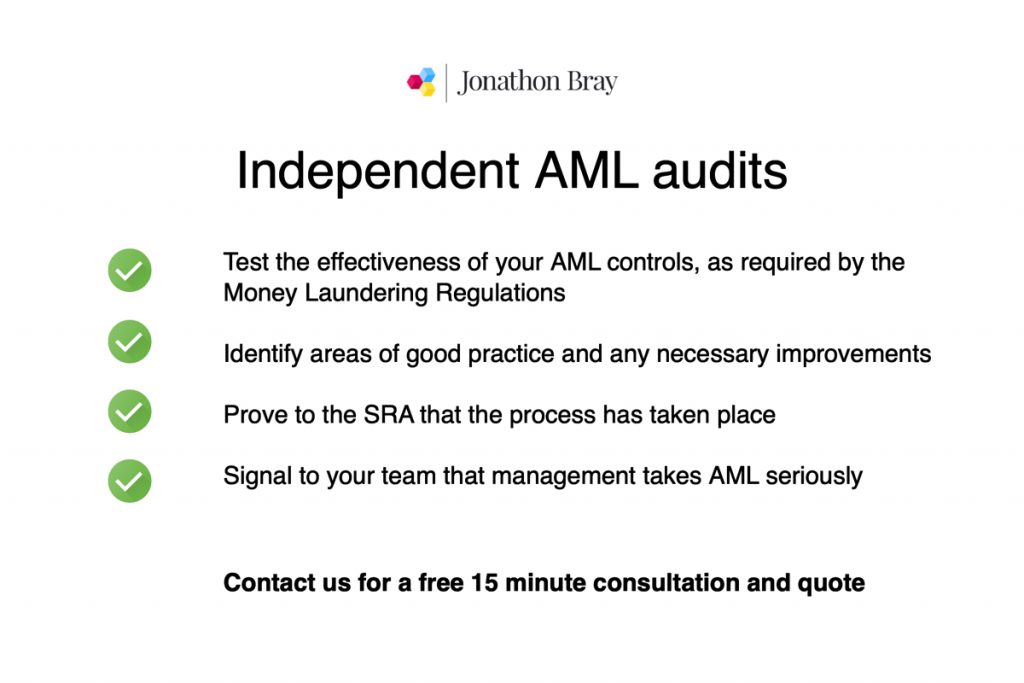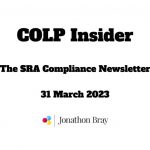Are Our AML Processes OTT For ‘Out Of Scope’ Work?
We all know that anti-money laundering compliance is an important part of any law firm’s risk management. Get it wrong, and the consequences can be severe.
But AML compliance can place unnecessary friction between you and your client.
In other words, firms should consider whether they strike the right balance between meeting their legal obligations, internal risk appetite and client service.
Indeed, one of the conclusions we reached at a our most recent webinar (‘New LSAG guidance | Recent SRA focus | Client and matter risk assessments‘ – see recording and slides below) was that the real challenge of AML compliance is not so much in keeping up to date with the complex web of law, regulation and guidance; but boiling it down into effective, efficient business processes.
COLPs: Are You Ready For The SRA Sanctions Questionnaire? [31 May Deadline]
The regulator of solicitors in England and Wales has announced a new round of sanctions assessments. This takes the form of a mandatory SRA sanctions questionnaire.
The assessment will be sent by email to firms’ Compliance Officer for Legal Practice (COLPs) or authorised signatory. Make sure that your team looks out for the SRA email, and do check your spam filters to ensure you do not miss the 31 May deadline.
Read more about the SRA sanctions questionnaire
Sanctions Checks And GDPR – What’s Your Lawful Basis For Processing Third Party Personal Data?
ICYMI: LSAG AML guidance updated (March 2023)
The Legal Sector Affinity Group (LSAG) has published a 2023 update to its AML guidance for regulated law firms. Updates of note:
- The discrepancy reporting requirement has been significantly restricted.
- There is a new ‘anti-proliferation financing’ duty.
The guidance is intended to help solicitors and law firms understand their legal obligations under the Money Laundering, Terrorist Financing and Transfer of Funds (Information on the Payer) Regulations 2017.
News and Guidance

SRA Updates
- AML – Guidance on our firm inspections – The SRA has provided guidance about its firm inspections, which consist of detailed evaluations of the firm’s policies and procedures, as well as on-site visits conducted by SRA auditors.
Having identified deficiencies in its first rounds of visits, the SRA is particularly focussing on:
- client and matter risk assessments
- source of funds and wealth
- sanctions compliance
That is in addition of course to all the other elements of money laundering compliance (firm-wide risk assessments, policies, training, client due diligence and so on).
Most firms are also expected to obtain an independent AML audit.
Note the increased fining and naming-and-shaming approach for firms that cannot or will not comply.
- Gazette – SRA secures backing for new ‘toxic workplace’ rules – The Gazette reports that the SRA has secured support for the implementation of new rules that will address toxic workplace cultures in law firms. The rules aim to tackle the issue of bullying and harassment, which the regulator sees as a long-standing problem in the legal profession.
The report states that the new rules will require law firms to take responsibility for ensuring that their workplaces are free from discriminatory behavior, bullying, and harassment. It will also introduce a regulatory duty on law firm leaders to take action against cases of unacceptable behaviour that occur within their workplace.
The SRA’s new rules have received widespread support from various organisations, including the Law Society. Many legal professionals have also welcomed the changes, although some have suggested that it is unwise for a regulator to become embroiled in employment disputes.
Aggrieved parties will certainly have additional ammunition to use against managers if they fail to challenge toxic behaviour, or attempt to ‘close ranks’.
It is expected that the SRA will release further guidance on the implementation of the new rules in the coming months.
- Legal Futures – SRA to use new economic crime power “hundreds of times a year” – Legal Futures reports that the SRA plans to use its new economic crime power hundreds of times a year. The new powers, which are currently going through parliament, are designed to improve the SRA’s capability to tackle economic crime and protect the legal profession from being a facilitator of money laundering.
Indeed, the Economic Crime and Corporate Transparency Bill will also insert a new regulatory objective into the Legal Services Act for the SRA to ‘promote the prevention and detection of economic crime’.
By extension, regulated law firms will draw ever-closer to becoming another arm of law enforcement.
Law Society – New and updated practice notes (may require login)
- Guide: UK sanctions regime – The Law Society’s Sanctions Guide provides practical guidance for law firms on how to comply with legal and regulatory requirements related to the ever-increasing sanctions regime.
The guide explains the legal framework and provides advice on risk assessments, due diligence, and reporting suspicious activity. It also explains the consequences of non-compliance with sanctions rules and the actions that can be taken to mitigate those risks.
- Press release: Milestone climate change guidance for solicitors – The Law Society has issued guidance for solicitors, urging them to consider the impact of climate change in their advice to clients.
The guidance highlights six key areas where solicitors are advised to take into account climate-related risks, including analysing legal contracts and agreements, considering the financial risks associated with climate change, providing advice on green finance and sustainable investments, and examining the implications of climate change for property law.
According to the Law Society, the guidance is the first of its kind in the UK and reflects a growing awareness of the need for legal professionals to address the legal and practical challenges presented by climate change.
The guidance is seen as an important step in encouraging the legal sector to step up its efforts to tackle the climate crisis.
Other Updates
- UK Government factsheet: Failure to prevent fraud offence – The Economic Crime and Corporate Transparency Bill 2022 proposes a new offence of corporate failure to prevent fraud.
This means that a company can be prosecuted if one of its employees or agents commits fraud while acting in their capacity as a representative of the company, and the company did not have adequate procedures in place to prevent such conduct.
The proposed offence carries an unlimited fine, but will not apply to SMEs. Large organisations, as defined by the standard Companies Act 2006 definition, are the only ones included in order to ensure that business-related responsibilities are proportionate. These organisations meet two out of three of the following criteria: employing more than 250 individuals, having over £36 million in turnover, and possessing more than £18 million in total assets.
- NCA video (1): New SAR Portal – How to Register and Sign in
- NCA video (2): How to Submit a SAR using the new SAR Portal
Free webinars

1. Mediation in Employment Law Settings
In this fascinating session, Jeremy Phillips KC and James Bromige of Queen Square Chambers took us through this specific form of judicial mediation.
Employment lawyers: do not miss out on this free insight (and CPD!).
Recording: View here (use passcode =PT2$sw%)
Slides: Download here
Handout: Download here
2. New LSAG guidance | Recent SRA focus | Client and matter risk assessments
Jon, Rachael and Carly tackled some of the biggest issues facing law firms’ AML compliance. Are you up to speed with non-proliferation financing and discrepancy reporting? Do you know what to expect from an SRA visit? What do ‘client and matter risk assessments’ mean, and how should you implement them?
Recording: View here (use passcode =VQc8mW$)
Slides: Download here
SRA and SDT disciplinary decisions

- Paul Green – litigation assistant struck off for dishonestly altering the date and time stamp on an email serving court documents.
- Jane Stark – a rare finding, where the tribunal held that the solicitor’s dishonest conduct was in that narrow band of dishonesty that warranted a suspension rather than a strike off.
- Susan Hartley – struck off for forging trustees’ signatures.
- Mark Pittaway – struck off following conviction for indecent exposure offences.
- Catherine Reynolds – fined £2,000 following drink driving conviction.
- Mayuri Nitin Shah – struck off for overcharging a probate client (to the tune of £35k) and selling an estate property (for potentially a significant undervalue) to a Panamanian trust, of which she was a beneficiary.
- Daniel Paul Hugh Hutchings – fined £30k for unwanted touching and sexual harassment during a work event..
- Howard Ellis and Rafikul Ashrafi – non-lawyers separately struck off following convictions for the possession of indecent images.
- Richard Gamble – fined £1,875 following drink driving conviction.
- Goad & Butcher – firm fined £5k for persistent AML breaches.
- Arshad Ali Khan – rebuked for failing to comply with a court order for payment of rent for 3 years.
- Rachel Saunyama – unqualified member of staff struck off for dishonestly pretending to be a lawyer, and purporting to formally represent a client in an employment dispute.
- Victoria Phillips – fined £1,400 for drink driving offence.
- Asad Arif – rebuked following police caution for assault.
- Alvina Zia – struck of for dishonestly misleading the SRA and Insolvency Service during the fallout of her PI firm’s demise. She also acted for an immigration client when not authorised to do so and failed to comply with a Legal Ombudsman award.











